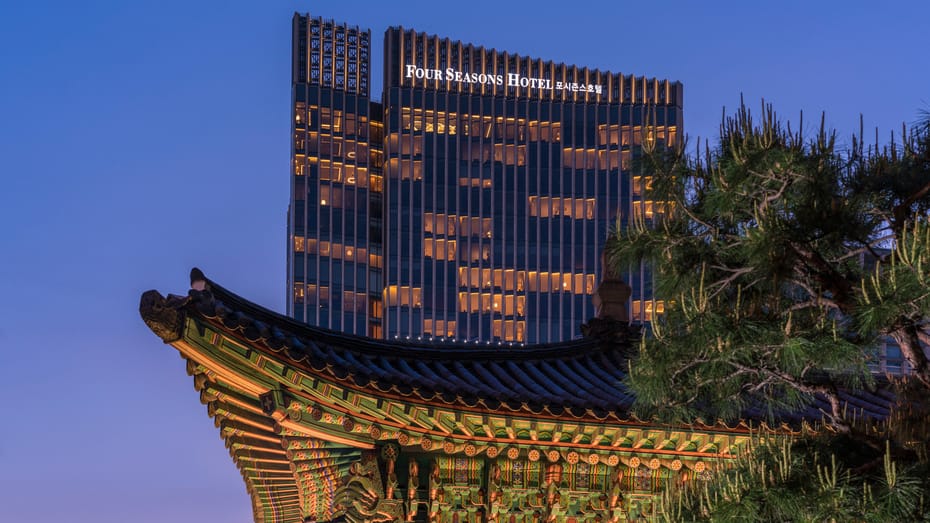The hotel industry in South Korea has been significantly shaped by the fascination with South Korea’s Hallyu. Initially bolstered by a surge in tourist interest, hotel businesses flourished, only to face a substantial setback following the COVID-19 outbreak, resulting in a sharp decline in revenue from KRW 9.19 trillion in 2019 to KRW 5.98 trillion in 2020.
Read our Korea’s MZ Generation report

However, a noteworthy turnaround transpired in 2023 as lockdowns eased, leading to a resurgence in tourist arrivals which led to a hotel industry revenue of KRW 10.21 trillion. This remarkable recovery, surpassing expectations, sets the stage for future growth opportunities. The South Korean hotel industry is poised for continuous growth. By 2027, it is expected to reach a market revenue of KRW 12.3 trillion.
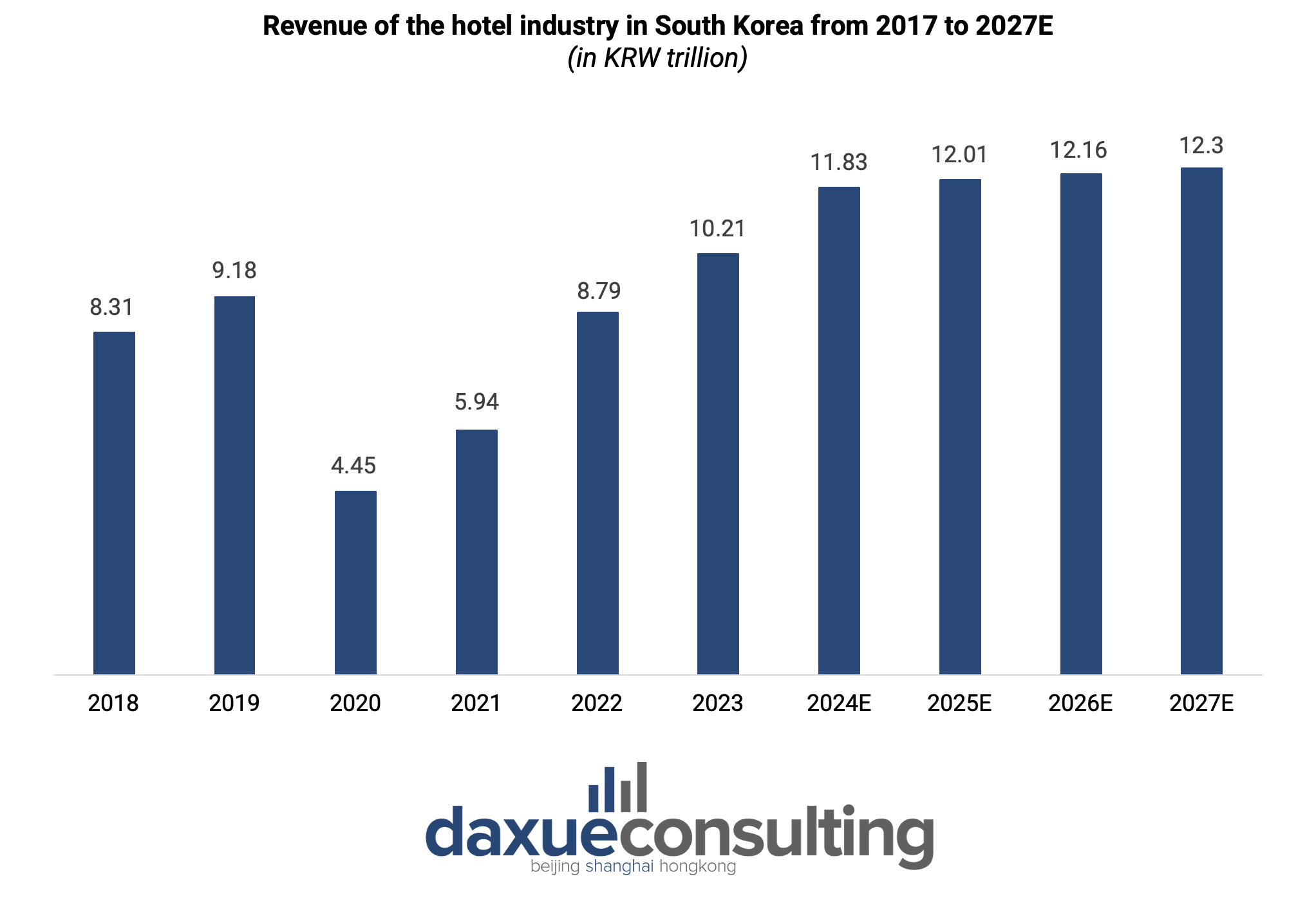
Hotel industry leaders in South Korea: tradition blends with luxury
South Korea offers a variety of high-end accommodations catering to diverse consumers amidst the rising trend of inbound tourism. Leading luxury hotels include The Shilla Seoul, Signiel Seoul, and Grand Hyatt Seoul.
These hotels are recognized for their high-quality service and more importantly for providing the guests an opportunity to experience Korean tradition with luxury. Signiel Seoul’s success, for example, is not only attributed to its modern amenities but also to its commitment to showcasing traditional Korean beauty in its finest accommodations.
Moreover, the perfect location of these hotels gives them an upper hand. In a March 2023 survey, about 22% of participants highlighted the importance of convenient access to tourist attractions and transportation when choosing accommodation. Many leading hotels are situated in the city center, allowing visitors to experience seamless access to key destinations and transportation hubs.
Shilla Hotel: Elevating luxury with a touch of history
Named in honor of the ancient Shilla Dynasty, representing a prosperous golden age in Korea, The Shilla Seoul holds a unique historical concept. As part of the Korean chaebol Samsung Group, it harmonizes modernism and tradition, offering a distinctive experience. With an emphasis on luxury services, exceptional customer care, and a range of traditional dining options, the hotel has earned favor, particularly among celebrities.
Notably, in Q3 2023, the hotel demonstrated resilience and commitment to excellence by achieving revenue of KRW 166.7 billion, reflecting a commendable 9% year-on-year increase. This financial success underscores the hotel’s dedication to maintaining strong performance and adaptability to evolving circumstances.
From sky-high views to cultural splendor: The Signiel Seoul experience in the tallest building in Korea
Signiel Seoul, situated in Lotte World Tower, has garnered international recognition. It ranks among the “Top 50 Best Hotels in the World” and has won the esteemed “Villegiature Award” within six years of opening. Its Korean Premier room is celebrated for its embodiment of traditional Korean beauty, seamlessly blending cultural elements with modern luxury. Located in the tallest building in Korea, guests can enjoy panoramic views of Seoul from the 76th to the 101st floors and the Han River.
Grand Hyatt in one of Seoul’s most affluent and trendiest neighborhood
Grand Hyatt Seoul’s minimalist design and opulent dining options create an ambiance blending modern luxury with classical elegance. The hotel has become a symbol of prestige, offering guests an unparalleled experience that blends contemporary comforts with the grace of tradition. Its strategic location in the vibrant Hannam neighborhood provides convenient access to the city’s cultural and business hubs.
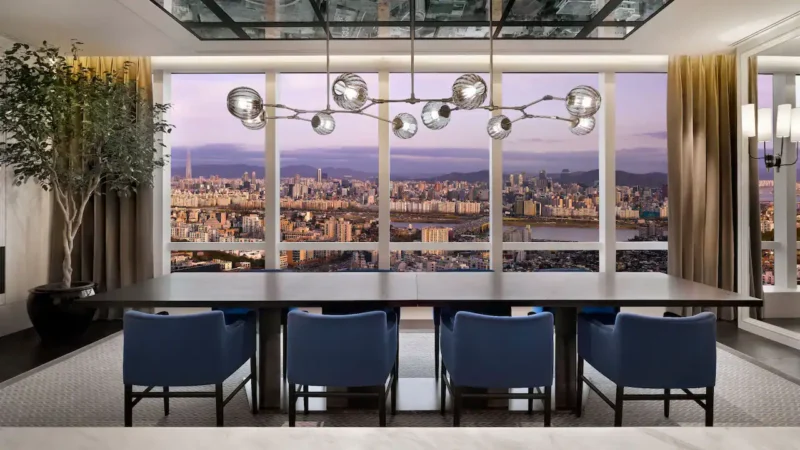
Brand name is not enough: the strategies hotels use to attract guests and increase their revenue
In Korea’s competitive hotel industry, hotels employ diverse strategies including technological innovations, collaborations, and promotions to distinguish themselves and boost revenues.
Smart stays in South Korea: AI assistance in hotels creates an unusual hotel experience
South Korea, one of the most tech-savvy countries globally, is extending its advanced technology into the hotel experience. These technologies not only enhance the customer’s stay but also assist hotel staff in their tasks. For instance, Novotel Ambassador Hotel Dongdaemun has AI robots in hotel rooms to allow guests to control lights, and room temperature, and access hotel information using simple voice commands. KT AI’s Giga Genie is a prime example, understanding four languages and available around the clock for voice commands.
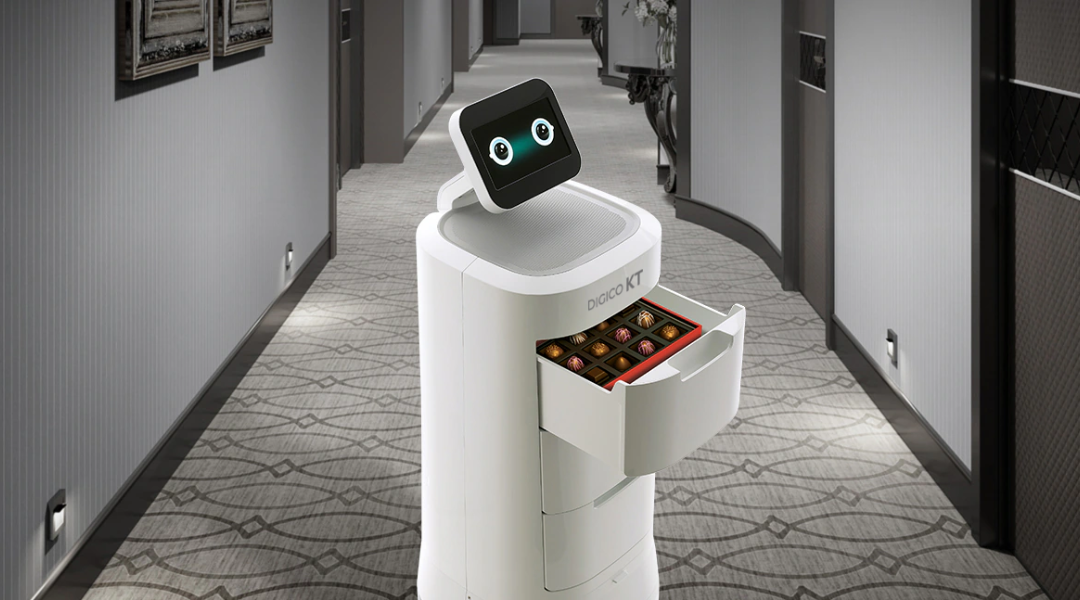
Another notable tech perk is the use of AI-powered robots in hotels. These robots, like Hyundai’s hotel delivery robot at Rolling Hills Hotel, take care of guest requests, delivering towels, water, or anything else needed directly to the room. This not only eases the workload for hotel staff but also adds a unique and convenient touch to the overall hotel experience in Korea.
Accommodation with “extra services” is what makes guests remember their stay
Hotels are involved in co-branding in South Korea with brands from various industries and artists to craft memorable experiences and enhance their brand image. For example, L’Escape Hotel teamed up with Starbucks to offer a special collaboration package. They provided a night stay at L’Escape’s Deluxe Room with exclusive Starbucks-themed gifts.

Meanwhile, Four Seasons Hotel Seoul collaborated with Spanish artist Eva Armisén in 2023 to celebrate creativity and culture through her internationally renowned art. Themed around Seoul’s four seasons, her paintings are displayed throughout the hotel. Alongside them are special offerings like a children’s room package and art-inspired cocktails.
Four Seasons Hotel also introduced the “Timeless Beauty” room package with beauty brand History of Whoo, inspired by Korea’s Empresses. It includes The History of Whoo Hwanyu Imperial Youth Discovery Kit, a spa facial, access to a Korean traditional sauna, and visits to the historical wonders of Gyeongbok Palace and Changdeok Palace. This blend of luxurious skincare and spa indulgence and cultural exploration allows guests to immerse themselves in Korea’s timeless beauty and regal traditions.
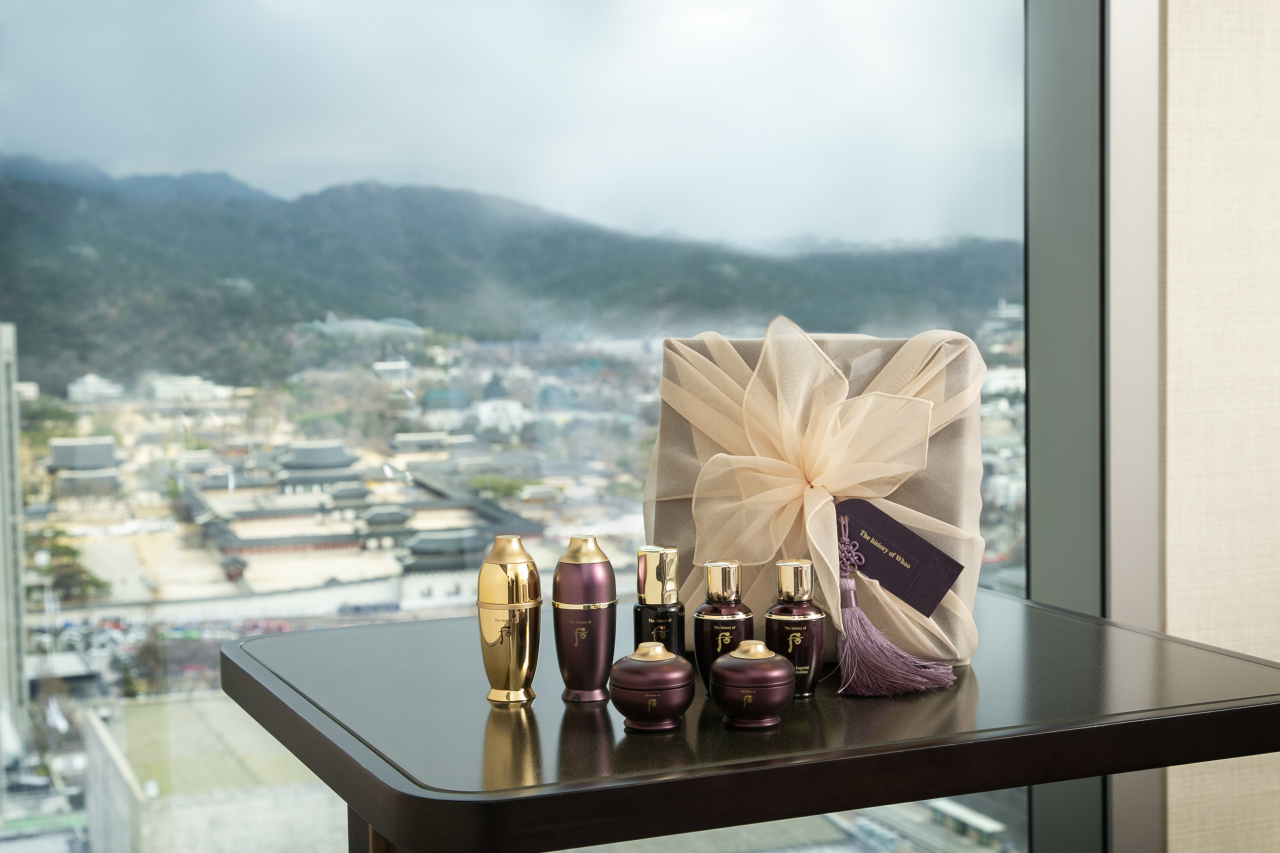
Hotels offer more than accommodations, particularly on special occasions
On special occasions such as Seollal in Korea, many locals opt to go on a hocance (호캉스), or hotel vacance. In a March 2023 survey, approximately 33% of participants said that they stayed in a hotel during their local trip. In response, hotels offer promotions and packages that drive people to visit them and even return.
South Korea’s trio of short holiday escape
Seollal, Chuseok (Korean Thanksgiving), and Christmas in Korea are among the top three celebrated holidays. Seollal and Chuseok particularly lead to a surge in bookings as Koreans travel both domestically and abroad.

Park Hyatt Seoul’s New Year celebration offered 200 lucky bags with dining vouchers. It provided a chance to enjoy a full-course meal at Cornerstone, including complimentary cake and Dom Perignon. Meanwhile, Sheraton Grand Incheon Hotel’s “Winter Holiday View & Pool” package allowed guests to enjoy the West Sea with a bottle of signature red wine, and unlimited use of the indoor heated pool.
On Seollal, Haevichi Hotel and Resorts unveiled an enticing promotion featuring exclusive gift sets. Its limited-edition package, curated by Haevichi’s skilled chefs, included a selection of culinary delights such as pine mushrooms, abalone in soy sauce, and a hanwoo sukiyaki meal kit. Notably, hanwoo, premium Korean beef, is a popular and delightful gift during Lunar New Year, promising a unique celebration.
Spring rush: Tourists and locals flock to hotels in South Korea
Spring blooms in South Korea attract the highest number of visitors, leading to a surge in demand for hotels. Independence Day, Children’s Day, and Buddha’s Birthday, all occurring during spring, contribute to hotels reaching full occupancy. Spring is also an attractive season for tourists due to its moderate temperatures and unparalleled beauty, highlighted by cherry blossoms.
Convenient booking and sustainability are a must to prepare for peak seasons driving a crowd to hotels
Several factors influence hotel occupancy rates in South Korea, reflecting changing consumer preferences and the impact of specific seasons and events.
Convenient booking – ease of booking
South Koreans prefer the convenience of easy-to-use booking platforms. Reservation applications include Yanolja and Yogiotte boasting over 15 million users and 18 million users, respectively, in 2024. Consumers book larger hotels like Lotte and Hyatt through these platforms or the hotels’ official websites. Smaller establishments rely on these platforms, allowing consumers to review and compare hotels and prices.
Sustainability are crucial factors in choosing a hotel to stay in Korea
In response to South Korea’s strong emphasis on eco-friendly consumption (ranking third globally in recycling), hotels are prioritizing eco-friendly practices. LOTTE Hotels, for example, manages its own LOTTE Carbon and Environmental Management System (LCEMS) in all its hotels to track and verify energy consumption and greenhouse gas emissions. It has also implemented other eco-friendly initiatives, such as the “Gray Card” system to reduce laundry, and customer participation programs like plogging.
Hotel industry in South Korea: industry overview, major players, strategies to boost bookings, factors affecting occupancy rates
- With growing inbound tourism and local consumers going on vacance, the South Korean hotel industry is experiencing growth after the COVID-19 outbreak.
- Many hotel industry leaders in South Korea such as Shilla Hotel are popular for blending Korean tradition with luxury.
- Hotels leverage advanced technologies such as AI voice commands and AI robots, co-branding initiatives, and special promotions to attract customers and increase their revenue.
- Occupancy rates of Hotels in South Korea is often based on convenient booking experience, sustainability trends, and special seasons/holidays.


